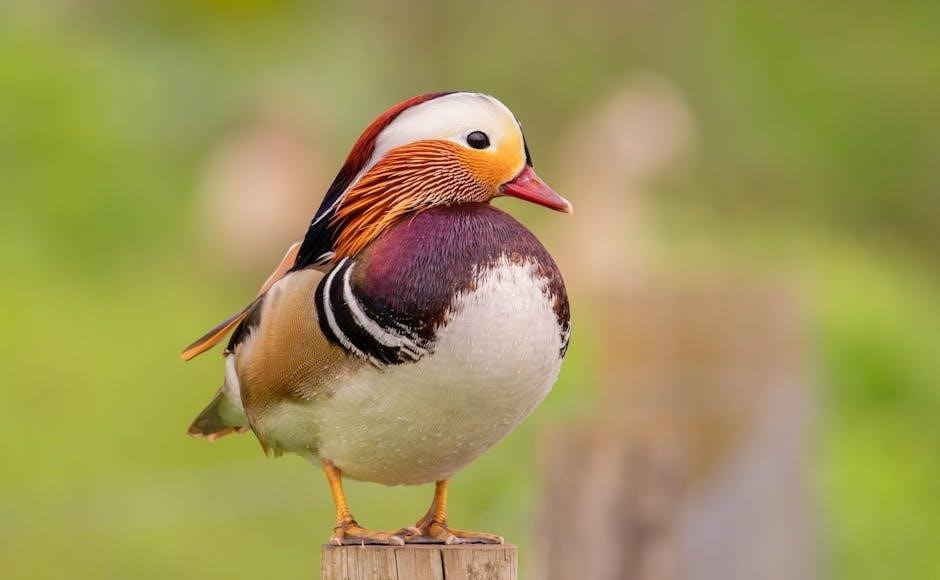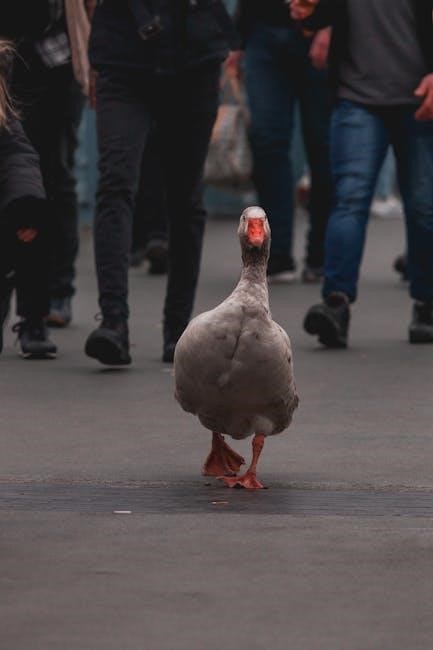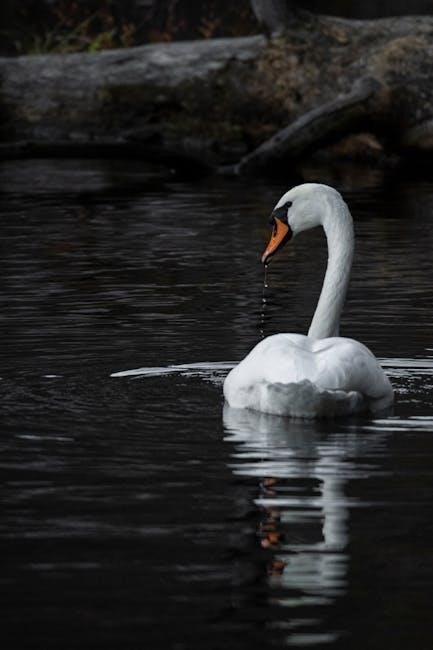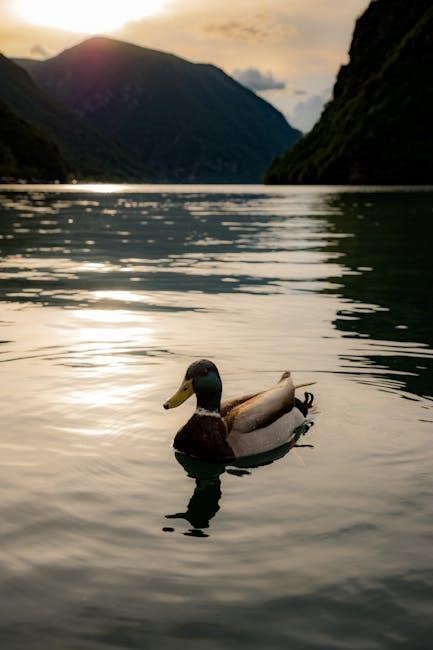North Carolina duck hunting is renowned for its diverse waterfowl and expert guides. Top services like Eastern OBX Guide Services, Jennetts Guide Service, and Eastern Waterfowl Guide Service provide exceptional experiences. They specialize in sea duck hunting, swan hunts, and open water adventures, ensuring memorable and successful outings for hunters of all skill levels.
1.1 Overview of Duck Hunting in North Carolina
North Carolina offers exceptional duck hunting opportunities, attracting enthusiasts with its diverse waterfowl species and prime habitats. From sea duck hunting along the coast to puddle duck hunting in inland wetlands, the state provides a variety of experiences. Key locations like Hyde County and Lake Mattamuskeet are renowned for their abundant bird populations. Guides play a crucial role in navigating these areas, ensuring successful hunts. The state’s rich wildlife and expert guide services make it a top destination for waterfowl enthusiasts nationwide.
1.2 Importance of Guides in NC Duck Hunting
Hiring an experienced guide is crucial for a successful duck hunting trip in North Carolina. Guides possess local knowledge of prime hunting spots, weather patterns, and bird behavior, maximizing your chances of a productive hunt. They also ensure compliance with regulations and promote ethical practices. With numerous guides available, choosing the right one can enhance your experience. Their expertise in decoy placement, calling, and habitat understanding makes them invaluable for both seasoned hunters and newcomers to the sport.
Top NC Duck Guides and Their Services

Eastern OBX Guide Services, Jennetts Guide Service, and Eastern Waterfowl Guide Service are leading providers, offering expert guidance, specialized hunting trips, and unforgettable waterfowl experiences in North Carolina.
2.1 Eastern OBX Guide Services
Eastern OBX Guide Services, based in Hyde County near Lake Mattamuskeet, offers exceptional waterfowl hunting experiences. Known for their expertise in sea duck and swan hunting, they utilize Ron Bankes layout boats, which are spacious and stable, providing an immersive on-the-water experience. Their guides are seasoned professionals who ensure a successful hunt. They cater to both novice and experienced hunters, covering prime locations like the Outer Banks and coastal regions. Check their website for contact details and essential gear recommendations.
2.2 Jennetts Guide Service
Jennetts Guide Service, located in Hyde County near Lake Mattamuskeet, is a top choice for waterfowl enthusiasts. Specializing in sea duck and swan hunting, they offer expertly guided hunts in prime coastal locations. Their experienced guides ensure a high success rate, making them a favorite among hunters. Known for their professionalism and knowledge of local waters, Jennetts provides unforgettable experiences. They are particularly renowned for their tundra swan hunts, attracting hunters seeking a unique challenge in North Carolina’s diverse waterfowl habitats.
2.3 Eastern Waterfowl Guide Service
Eastern Waterfowl Guide Service, based in Wilmington, NC, offers exceptional guided duck hunts along the state’s coast. Known for their expertise in open water hunting, they cater to both novice and experienced hunters. Their guides are well-versed in local waterfowl patterns and habitats, ensuring successful outings. The service covers a wide range of coastal areas, providing access to diverse duck species. With a focus on safety and camaraderie, Eastern Waterfowl delivers unforgettable experiences, making them a trusted name in North Carolina’s duck hunting community.

Best Locations for Duck Hunting in NC
North Carolina offers diverse duck hunting spots, including Hyde County’s Lake Mattamuskeet, coastal regions for sea ducks, and private lands with abundant waterfowl, ensuring a rich hunting experience.
3.1 Hyde County and Lake Mattamuskeet
Hyde County, particularly Lake Mattamuskeet, is a premier destination for duck hunting in NC. Known for its abundant waterfowl, including tundra swans and sea ducks, the area attracts hunters nationwide. Guides like Jennetts Guide Service excel here, offering expert knowledge and access to prime locations. The region’s unique wetlands and migratory patterns make it a hotspot during hunting seasons, providing a challenging yet rewarding experience for enthusiasts.
3.2 Coastal Regions and Open Water Areas
North Carolina’s coastal regions and open water areas are highly sought after for duck hunting, offering diverse opportunities to target various species. Guides like Eastern Waterfowl Guide Service specialize in these dynamic environments, providing access to expansive hunting grounds. The coastal waters attract a wide range of waterfowl, from sea ducks to puddle ducks, making each hunt unique. Hunters often use layout boats for stability and concealment, while open water areas require strategic planning and knowledge of tidal patterns to maximize success.
3.3 Private Lands and Their Advantages
Hunting on private lands in North Carolina offers a more exclusive and controlled environment, often providing better access to waterfowl. Guides frequently have access to private impoundments, where habitat management enhances duck populations. These areas are less crowded, allowing hunters to focus on their targets without competition. Private lands also enable guides to tailor the experience to specific hunting styles, ensuring a more personalized and successful outing. This exclusivity makes private land hunting a preferred choice for many serious waterfowl enthusiasts.
Types of Duck Hunting in NC
North Carolina offers various duck hunting experiences, including sea duck, puddle duck, and tundra swan hunting; Each type provides unique challenges and opportunities for hunters.
4.1 Sea Duck Hunting
Sea duck hunting in North Carolina is a thrilling experience, with guides like Jennetts Guide Service excelling in this domain. These experts specialize in targeting species such as scoters and long-tailed ducks, often in coastal waters. The use of layout boats, like those employed by Eastern OBX Guide Services, enhances the hunt’s intensity. Hunters benefit from expert knowledge of migration patterns and optimal locations, ensuring a memorable and productive adventure along the NC coast.
4.2 Puddle Duck Hunting
Puddle duck hunting in North Carolina focuses on smaller waterfowl like gadwalls, wigeons, and green-winged teals. Guides often target freshwater marshes and impoundments, particularly in Hyde County near Lake Mattamuskeet. Private lands offer advantages, including less competition and controlled environments. While less consistent than sea duck hunting, puddle duck hunts provide exciting opportunities for hunters to test their skills with decoys and calls in serene, picturesque settings. Experienced guides ensure a strategic and enjoyable experience.
4.3 Tundra Swan Hunting
Tundra swan hunting in North Carolina offers a unique and thrilling experience, with Hyde County and Lake Mattamuskeet being prime locations. Guides like Jennetts Guide Service specialize in swan hunts, providing expert knowledge and strategic setups. Hunters can expect a challenging yet rewarding experience, as swans are highly regulated and require special permits. The combination of skilled guidance and pristine habitats makes NC a top destination for tundra swan enthusiasts seeking unforgettable waterfowl adventures. Proper planning and adherence to regulations are essential for success.
Preparing for a Duck Hunt in NC
Preparing for a duck hunt in NC involves checking weather forecasts, gathering essential gear, and obtaining necessary licenses and permits. Understanding local regulations and hunting areas is crucial for a successful and legal hunting experience. Proper preparation ensures safety and compliance, making the hunt enjoyable and productive.
5.1 Necessary Licenses and Permits

To hunt ducks in North Carolina, you must obtain a valid North Carolina Resident Hunting License and a Federal Duck Stamp. Non-residents require a Non-Resident Hunting License. Ensure compliance with state and federal regulations, as bag limits and species restrictions vary. Additional permits may be needed for specific hunting areas or species, such as tundra swans. Always verify the most up-to-date licensing requirements before your hunt to avoid penalties and ensure a smooth experience.
5;2 Essential Gear and Equipment
For a successful duck hunt in North Carolina, essential gear includes breathable waders, a reliable shotgun, and non-toxic ammunition. Decoys, calls, and blinds are crucial for attracting waterfowl. Camouflage clothing and a hat help hunters blend in. Bring binoculars for spotting and a thermos for staying warm. Layout boats, used by many guides, provide stability and concealment. Always check the weather and pack accordingly. Ensure all gear is in good condition to maximize your hunting experience and comfort in the field.
5.3 Understanding Weather Conditions
Weather plays a critical role in duck hunting success. Cold fronts often push waterfowl south, increasing activity. Rain and wind can make ducks more active, while clear skies may reduce movement. Hunters should monitor forecasts to plan effectively. Be prepared for varying conditions with appropriate clothing and gear. Understanding how weather influences duck behavior helps maximize hunting opportunities and ensures a safer, more enjoyable experience in North Carolina’s diverse habitats.

Tips for Booking a Duck Guide
Research guide services thoroughly, check reviews, and book early. Ensure clear communication about your needs and expectations. Verify licenses and experience for a reliable hunting experience.
6.1 Choosing the Right Guide for Your Needs
Selecting the right guide ensures a tailored hunting experience. Consider their expertise in your preferred hunting style, such as sea duck or puddle duck hunting. Check their reputation through reviews and references. Ensure they offer the type of hunt you desire, whether on private lands or open water. Discuss your expectations beforehand to align goals and maximize success. A good guide adapts to your skill level, ensuring a memorable and productive hunt in North Carolina’s diverse waterfowl habitats.
6.2 Checking Reviews and References
Researching a guide’s reputation is crucial for a successful hunt. Read reviews from multiple sources to gauge consistency in service quality and hunting success. Ask for references and contact past clients to verify experiences. Ensure the guide has a proven track record in your desired hunting style, such as sea duck or puddle duck hunting. A reputable guide will proudly share testimonials and ensure transparency, building trust before your hunt begins in North Carolina’s waterfowl-rich regions.
6.3 Making Reservations in Advance
Booking a guide early is essential, especially during peak hunting seasons. Popular services like Eastern OBX Guide Services and Jennetts Guide Service often fill up quickly. Plan ahead to secure your preferred dates, particularly for sought-after locations like Hyde County. Confirming reservations well in advance ensures availability and allows guides to prepare tailored experiences. Don’t wait—reserve early to avoid missing opportunities for a successful and memorable North Carolina duck hunting adventure with experienced professionals.
Strategies for a Successful Hunt
Identify prime areas, use decoys effectively, and time your hunt according to weather and bird activity. Patience and adaptability are key for a fruitful experience.
7.1 Identifying Prime Hunting Areas
Prime hunting areas in North Carolina are often near water sources like Lake Mattamuskeet and coastal regions. Guides recommend scouting locations with visible duck activity, such as feathers or feeding plants. Using maps and apps like OnX helps pinpoint accessible spots. Early setup and maintaining a distance from other hunters, around 500 yards, enhances success. Hyde County and private lands are particularly favored for their abundant waterfowl and secluded environments;
7.2 Using Decoys and Calls Effectively
Decoys and calls are crucial for attracting waterfowl in North Carolina. Motion decoys add realism, while high-quality calls mimic species-specific sounds. Guides recommend using a mix of dabblers and divers to match the target species. Timing and cadence in calling are key to convincing ducks. Experienced guides like those from Eastern OBX and Jennetts Guide Service excel in creating authentic setups, ensuring a seamless hunting experience in coastal and open water environments.
7.3 Timing and Patience in the Field
Success in NC duck hunting hinges on timing and patience. Prime hunting occurs during early mornings and late afternoons when ducks are most active. Guides emphasize waiting for the right moment to shoot, avoiding premature shots that scare flocks. Patience also involves adapting to weather conditions, as cold fronts often improve hunting. Experienced guides like Eastern OBX and Jennetts Guide Service excel at positioning hunters during optimal times, ensuring a rewarding and effective hunt in North Carolina’s diverse waterfowl habitats.

Conservation Efforts in NC Duck Hunting
NC duck hunting emphasizes sustainability through regulated bag limits and habitat preservation. Ethical practices ensure balanced ecosystems, protecting waterfowl populations for future generations while promoting responsible hunting traditions.
8.1 Regulations and Bag Limits

North Carolina enforces strict regulations and bag limits to ensure sustainable duck hunting. Hunters must adhere to season dates, daily bag limits, and species-specific restrictions. These measures, set by the NC Wildlife Resources Commission, protect waterfowl populations and maintain ecological balance; Compliance with these rules is crucial for the long-term health of duck populations and the preservation of hunting opportunities for future generations. Staying informed about current regulations is essential for all hunters.
8.2 Habitat Preservation Initiatives
North Carolina prioritizes habitat preservation to support waterfowl populations. Wetland restoration projects, managed by organizations like Ducks Unlimited and the NC Wildlife Resources Commission, focus on enhancing coastal ecosystems. Programs protect critical habitats such as marshes, swamps, and shallow water areas. Public-private partnerships ensure sustainable land use, benefiting both wildlife and hunters. These efforts maintain biodiversity and ensure thriving habitats for migratory ducks, making NC a vital stopover on the Atlantic Flyway.
8.3 Ethical Hunting Practices
Ethical hunting practices are vital for sustainable waterfowl management. Hunters must respect wildlife, habitats, and fellow hunters. This includes adhering to bag limits, avoiding overhunting, and minimizing environmental impact. Guides emphasize fair chase and humane practices, ensuring a balance between recreation and conservation. Responsible hunting fosters respect for nature and preserves opportunities for future generations, aligning with North Carolina’s commitment to wildlife stewardship and outdoor traditions.